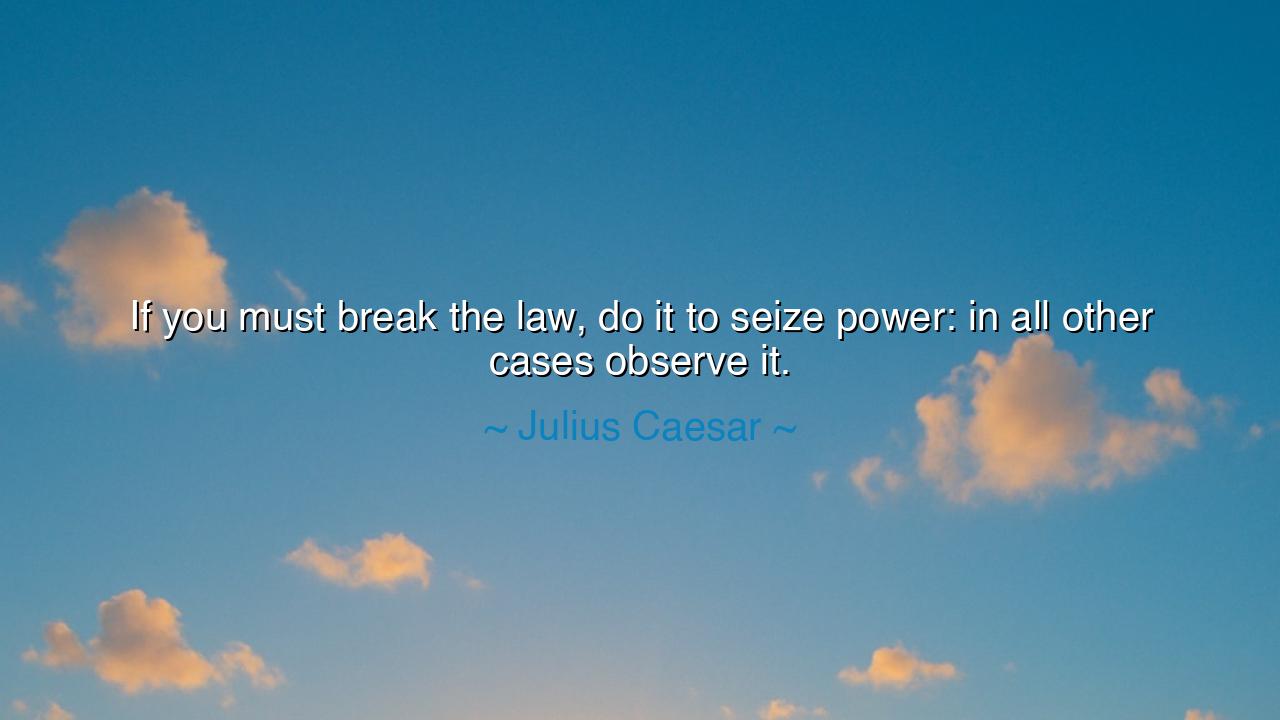
If you must break the law, do it to seize power: in all other






Julius Caesar, soldier, statesman, and master of ambition, once uttered the chilling yet practical words: “If you must break the law, do it to seize power: in all other cases observe it.” This saying, like a blade drawn in moonlight, reflects both the pragmatism and ruthlessness of Rome’s most famous conqueror. It is not a gentle teaching, nor one cloaked in moral softness. Rather, it is the wisdom of a man who knew the nature of power—that laws are chains upon the weak, yet tools in the hands of the strong, and that when one dares to break them, it must be only for the highest prize.
The meaning of this declaration lies in the balance between order and ambition. Caesar does not call for rebellion in every matter, nor for the reckless casting aside of law. He warns instead that to break the law frivolously is folly, for it invites ruin. But to break the law for power—for the throne, for command, for the authority that shapes the destiny of nations—this, he argues, may justify the peril. For in power lies the ability to rewrite laws, to command armies, and to place oneself beyond judgment. In this view, lesser transgressions are dangerous; but the supreme transgression, if successful, is transformative.
The origin of this thought can be found in Caesar’s own life. He crossed the Rubicon in 49 BCE, breaking the law of Rome by bringing his legions into Italy, an act forbidden to generals. It was an act of treason, punishable by death. Yet in that moment, Caesar chose ambition over obedience. His gamble led to civil war, and in the end, to his mastery of Rome itself. The law he broke was absolute; yet by seizing power, he placed himself above it. His words, therefore, are not empty philosophy, but the distilled creed of his own life.
History offers many echoes of this principle. Consider Napoleon Bonaparte, who in 1799 staged a coup against the French Directory. He shattered the constitution of the republic, but in doing so, seized command of France. Like Caesar, he broke the law, but only to obtain the supreme prize of power. Once enthroned, he reshaped the laws themselves in his image, codifying his will into the Napoleonic Code. Both men remind us that when the powerful seize rule, their unlawful act is often later sanctified as destiny.
There is something deeply emotional and unsettling in this teaching, for it forces us to confront the raw nature of politics and ambition. We like to believe that laws are sacred, that they bind all men equally. Yet Caesar’s words reveal the truth that has echoed since time immemorial: the law restrains those without power, while those with the courage—or audacity—to reach for power may bend the law to their will. This is not the counsel of justice, but of realism, forged in the brutal arena of Roman politics.
To future generations, this quote stands as both warning and lesson. The warning is that ambition unchecked by virtue can justify any crime, and that men who seize power through broken laws may bring both glory and ruin. The lesson, however, is also practical: respect the law in all ordinary matters, for it is the foundation of stability. But recognize also that there are moments in history when the law itself becomes an obstacle to destiny, and those who dare to shatter it may remake the world. Such moments are rare, perilous, and heavy with consequence.
The lesson for each of us is to discern carefully. Do not treat Caesar’s words as license for arrogance or petty rebellion. Instead, understand that laws preserve order, and breaking them lightly destroys trust. Yet also know that in your own life, there may come moments when convention must be broken, when courage demands stepping beyond boundaries in order to create something greater. Practically, this means respecting the rules of society, but never allowing them to suffocate your higher calling, whether in art, in leadership, or in the defense of justice.
Thus Caesar’s words endure: “If you must break the law, do it to seize power: in all other cases observe it.” They remind us of the harshness of the world, and the peril of ambition. Let them be to us both a torch and a sword—warning against reckless disobedience, yet also urging us to see that sometimes, destiny itself demands defiance. And when that moment comes, it must be met with courage, for in hesitation both law and life will destroy the timid.






AAdministratorAdministrator
Welcome, honored guests. Please leave a comment, we will respond soon